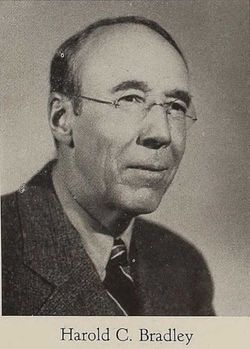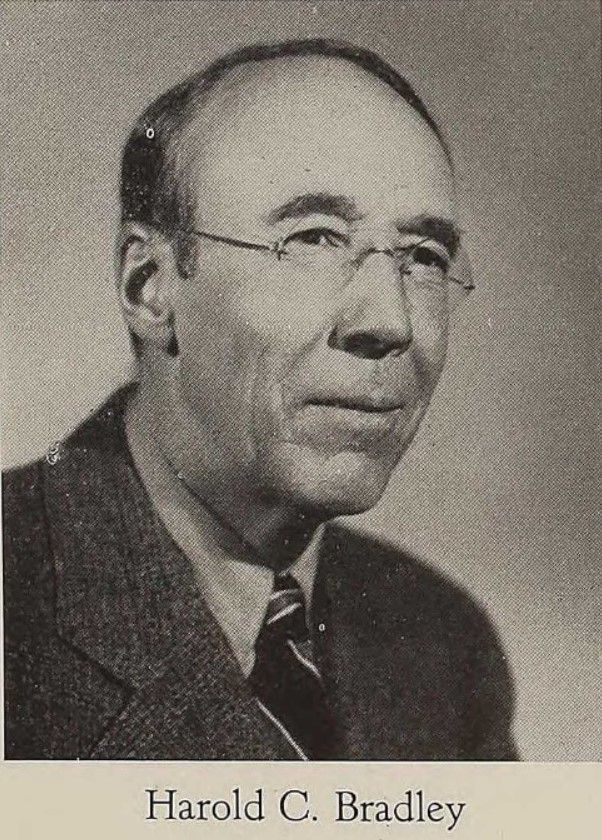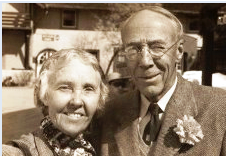He came to Madison as a junior professor of biochemistry at the University of Wisconsin. The first appointee to the UW Medical School, Dr. Bradley soon met, fell in love with and married a student, Mary Josephine Crane of the renowned Chicago industrialist Crane family.
In May 1909, the couple’s first child and only daughter, Mary Cornelia Bradley, was born. This little girl’s legacy would forever change the course of pediatric health care in Wisconsin.
Mary was only 6 years old when she was stricken with measles. In January 1916, shortly before her 7th birthday, Mary Cornelia Bradley died of meningitis. Deeply heartbroken by the loss of their firstborn child, the Bradleys yearned for a meaningful remembrance of their little daughter. As a loving tribute to Mary, they aspired to build a research and teaching hospital in connection with the UW Medical School.
The Bradleys raised $75,000 of the $93,000 needed to realize their dream, and by 1920, would witness the opening of the first children's hospital in Madison. Located at 1225 Linden Drive on campus, the facility would be named the Mary Cornelia Bradley Hospital for the Study of Children’s Diseases. (The building still remains and currently houses two UW-Madison departments.) The tragedy of Mary's short life, which forever changed the lives of the Bradley family, was transformed into a source of tremendous hope for countless children.
In 2007, the facility became part of the state-of-the-art American Family Children's Hospital. The Mary Cornelia Bradley Society continues its work in Madison.
Dr. Bradley earned his Ph.D. in physiological chemistry from Yale in 1905. As mentioned above, he then joined the faculty of the University of Wisconsin, Madison, as a junior professor in biochemistry and physiology. Shortly after, he was asked to become part of a team of three faculty members seeking to develop a medical education program at the university. In 1907, Bradley initiated instruction in physiology and physiological chemistry. Physiological Chemistry became an independent department in 1921 and was headed by Bradley until 1947. He retired from the University of Wisconsin in 1949.
Dr. Bradley was also instrumental in encouraging outdoor education through the Wisconsin Hoofers Clubs at the University of Wisconsin; a student residence as well as a lounge at the Wisconsin Union are named for him.
Married Mary Josephine Crane.
Children:
1. Mary Cornelia, b. 1909, d. 1916.
2. Charles Crane
3. Harold Cornelius, Jr.
4. David John.
5. Stephen Joseph.
6. Joseph Crane.
7. Richard Crane.
8. William Crane.
He came to Madison as a junior professor of biochemistry at the University of Wisconsin. The first appointee to the UW Medical School, Dr. Bradley soon met, fell in love with and married a student, Mary Josephine Crane of the renowned Chicago industrialist Crane family.
In May 1909, the couple’s first child and only daughter, Mary Cornelia Bradley, was born. This little girl’s legacy would forever change the course of pediatric health care in Wisconsin.
Mary was only 6 years old when she was stricken with measles. In January 1916, shortly before her 7th birthday, Mary Cornelia Bradley died of meningitis. Deeply heartbroken by the loss of their firstborn child, the Bradleys yearned for a meaningful remembrance of their little daughter. As a loving tribute to Mary, they aspired to build a research and teaching hospital in connection with the UW Medical School.
The Bradleys raised $75,000 of the $93,000 needed to realize their dream, and by 1920, would witness the opening of the first children's hospital in Madison. Located at 1225 Linden Drive on campus, the facility would be named the Mary Cornelia Bradley Hospital for the Study of Children’s Diseases. (The building still remains and currently houses two UW-Madison departments.) The tragedy of Mary's short life, which forever changed the lives of the Bradley family, was transformed into a source of tremendous hope for countless children.
In 2007, the facility became part of the state-of-the-art American Family Children's Hospital. The Mary Cornelia Bradley Society continues its work in Madison.
Dr. Bradley earned his Ph.D. in physiological chemistry from Yale in 1905. As mentioned above, he then joined the faculty of the University of Wisconsin, Madison, as a junior professor in biochemistry and physiology. Shortly after, he was asked to become part of a team of three faculty members seeking to develop a medical education program at the university. In 1907, Bradley initiated instruction in physiology and physiological chemistry. Physiological Chemistry became an independent department in 1921 and was headed by Bradley until 1947. He retired from the University of Wisconsin in 1949.
Dr. Bradley was also instrumental in encouraging outdoor education through the Wisconsin Hoofers Clubs at the University of Wisconsin; a student residence as well as a lounge at the Wisconsin Union are named for him.
Married Mary Josephine Crane.
Children:
1. Mary Cornelia, b. 1909, d. 1916.
2. Charles Crane
3. Harold Cornelius, Jr.
4. David John.
5. Stephen Joseph.
6. Joseph Crane.
7. Richard Crane.
8. William Crane.
Family Members
Sponsored by Ancestry
Advertisement
Records on Ancestry
Advertisement

















